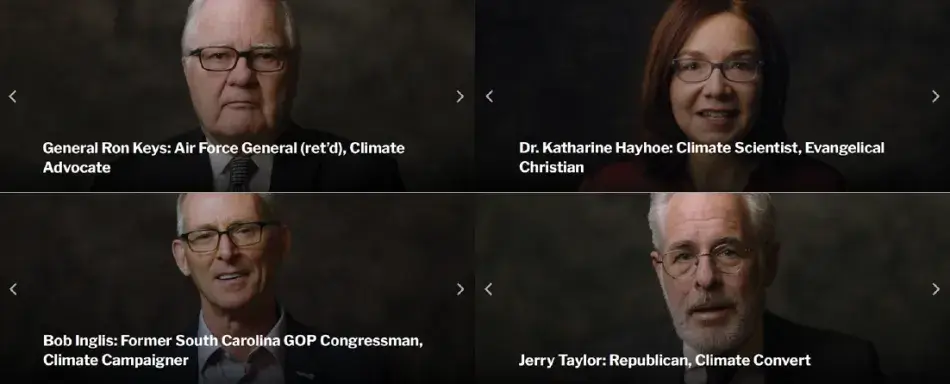Principle 6: Frame Climate Change as an In-Group Issue
People listen to and believe people they think of as like them and as liking them. Such in-group validation increases the acceptance of climate realities among those who identify with groups historically associated with a rejection of climate action.
Social and psychological schemas as well as an audience’s prior experiences, cultural contexts, and personal circumstances shape their responses to messages (Brossard and Lewenstein 2009). Human values affect individuals’ engagement with environmental issues in part by filtering the climate information to which one is exposed (Corner, Markowitz, and Pidgeon 2014). Communication can prime (that is, make more salient) specific values (Maio et al. 2009).
Focusing on some facets of an issue rather than others can affect the way an audience sees the issue and can influence audience response (Nisbet and Scheufele 2009). Climate change can, for example, be framed as an environmental problem, a health problem, a national security problem, or an economic problem. The impact of an issue frame is determined in part by the identities, values, and preexisting understandings of the audience (Scheufele 1999). Framing an issue in a way that is consistent with the values of an audience and does not threaten its ideological dispositions and identity should minimize identity-protective cognition. For example, affixing an environmental message to energy-efficient lightbulbs reduced the rate at which conservatives purchased them (Gromet, Kunreuther, and Larrick 2013). Conservatives were more receptive to environmental messaging focused on conservative values such as protecting the purity or sanctity of the environment from pollution and less receptive to ones focused on one’s moral responsibility to avoid environmental degradation (Feinberg and Willer 2013).
Scholars have argued that an important aspect of creating attitude change is to align with rather than compete with “vested interests, personal identity expression, social identity needs, and fears and phobias” (Hornsey and Fielding 2017) and that “the impact of cultural cognition would be relatively small if citizens observed persons of diverse values on both sides of the . . . debate” (Kahan et al. 2010).
Human beings need the protection of the tribe to thrive in a dangerous world. Researchers have measured intense brain activity in people sensing betrayal (Aimone, Houser, and Weber 2014). Perhaps because each of us knows the intensity of the betrayal response, we are cautious about straying from our respective tribes’ orthodoxies.
The orthodoxies of liberals and conservatives differ. In the United States, rejection of climate science is associated with identification as a conservative or libertarian (Lewandowsky, Gignac, and Oberauer 2015). Some have argued that conservatives are more likely to reject anthropogenic climate change because, while they might approve of science conducted in service of economic production (termed “production science”), they are less receptive to science in the service of understanding the impact human beings have on the environment and human health (“impact science”) because it is often used to justify governmental regulation of private-sector activity (Schnaiberg 1977; McCright and Dunlap 2011; McCright et al. 2013).
Messaging from Democratic elites favoring climate science and policies increased from 1990 to 2015, while it decreased among Republican elites (Merkley and Stecula 2018). As McCright and Dunlap (2011) argue, “Environmental protection typically entails governmental intervention into markets and restrictions on property rights, challenging conservative values, but is consistent with liberals’ view that protecting collective welfare is a proper role of government.” Messages emphasizing free-market solutions to climate change have been shown to increase conservatives’ climate change acceptance (Dixon, Hmielowski, and Ma 2017). Conservatives’ rejection of evidence of climate change may not reflect aversion to the science but rather “a conflict between specific ideological values and the most popularly discussed environmental solutions” (Campbell and Kay 2014).
The challenge to be addressed:
The identity-protective cognition of conservatives reinforces their reluctance to support action to address climate change.
The climate science:
The National Academy of Sciences’ (National Research Council 2011) reports and studies conducted by the U.S. Department of Defense (2014) and the National Security Council (Flavelle et al. 2021) have demonstrated the geopolitical impact of climate change, including sea-level rise, on U.S. national security. In a 2014 report, eleven retired U.S. generals and admirals identified climate change as a “catalyst for instability and conflict” and argued that it is a threat multiplier (IISD 2014).
